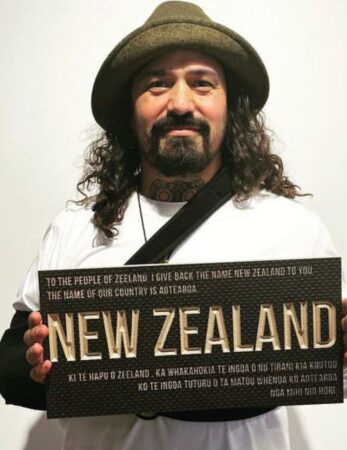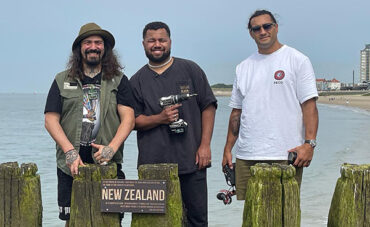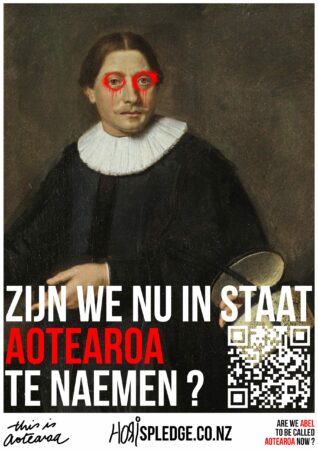New-Zealand is a colonial occupation, like the Dutch East Indies was an occupation
Text: Marjolein van Pagee, August 11, 2022, published in Dutch newspaper NRC
 Are we prepared to call New-Zealand ‘Aotearoa’, the original Mãori-name? Last week artist Hohepa Thompson, alias ‘Hori’, travelled all the way to Zeeland to ask us this question. A question that will surprise most Dutch people.
Are we prepared to call New-Zealand ‘Aotearoa’, the original Mãori-name? Last week artist Hohepa Thompson, alias ‘Hori’, travelled all the way to Zeeland to ask us this question. A question that will surprise most Dutch people.
Very early, on Saturday morning 30 July, Hori arrives in Zeeland. One and a half day earlier he took a plane from Auckland to London. Upon arrival he rents a car and together with his cameraman he takes the ferry to Calais. The beach of Vlissingen is his destination. At one of the wooden poles at the pier he puts a sign with the text: ‘To the people of Zeeland, I give back the name New-Zealand to you, the name of our country is ‘Aotearoa’. A New-Zealand TV-crew covers his action.
What is the history behind this? How come that Mãori-land has been named after Zeeland? Did the British not colonize the land? The Mãori are the indigenous people of New-Zealand and they are a minority in their own country. The descendants of the European colonists are still the most dominant group. Just like countries as Australia and the United States, New-Zealand is a colonial occupation, an appropriation of other people’s land. As a consequence, the language and culture of the Mãori was suppressed for a long time and framed as inferior.
This has changed in the last decades. The Mãori-culture is experienced as something positive again. In the past, people were punished for using Mãori language, whereas today it is almost considered ‘cool’ to be able to speak a few words. The national rugby team ‘the All Blacks’ internationally popularized the Mãori-dance ‘the haka’ as a proud cultural expression.
 This renewed attention does not mean that issues with racism and exclusion are solved. New-Zealand remains a colony. That this is the case is illustrated by an initiative as ‘the Hobson’s pledge’. The people behind this lobby, which was founded in 2016, are annoyed by initiatives and regulations that aim to fight the discrimination against Mãori. Last year they started the petition: ‘New-Zealand, NOT Aotearoa’, which is now signed by 58.000 people.
This renewed attention does not mean that issues with racism and exclusion are solved. New-Zealand remains a colony. That this is the case is illustrated by an initiative as ‘the Hobson’s pledge’. The people behind this lobby, which was founded in 2016, are annoyed by initiatives and regulations that aim to fight the discrimination against Mãori. Last year they started the petition: ‘New-Zealand, NOT Aotearoa’, which is now signed by 58.000 people.
When Hori heard about this, he decided to set up a counter-campaign. He prepared huge banners with the text: ‘Are we Abel to be called Aotearoa now?’ and placed them on a trailer behind his car. In the past month he drove from the most northern part to the south, a distance of more than 2,000 kilometres.
The word ‘Abel’ is referring to the Dutch VOC-captain Abel Tasman who in 1642 arrived in Aotearoa as the first European. After his trip the VOC-leadership decided to name this area after the Dutch province Zeeland, a name that the British later took over as well.
 Next to Vlissingen, Hori also makes a stop at the village Krabbendijke, after that he continues his trip to Rotterdam, Leiden and Amsterdam. Everywhere he goes he puts posters with an image of Tasman and the question whether we are prepared to use the name ‘Aotearoa’. A QR-code refers to the website ‘Hori’s Pledge’ where he addresses us, Dutch people directly.
Next to Vlissingen, Hori also makes a stop at the village Krabbendijke, after that he continues his trip to Rotterdam, Leiden and Amsterdam. Everywhere he goes he puts posters with an image of Tasman and the question whether we are prepared to use the name ‘Aotearoa’. A QR-code refers to the website ‘Hori’s Pledge’ where he addresses us, Dutch people directly.
With his project Hori questions the arrogance of European colonial nations that renamed areas as if people were not already living there. Giving back a colonial name, as he does, shows the absurdity of this tradition. Colonial doctrines, which exist for centuries, normalized behaviour that is not normal.
Here in the Netherlands we have a perpetrator of genocide, Jan Pieterszoon Coen, whose statue is still standing and after whom streets and bridges are named. In New-Zealand it is Abel Tasman who is being honoured and praised for ‘discovering’ the land. Both were in service of the murderous VOC, the biggest company that ever existed. With his action Hori also questions our ‘democratic constitutional state’ that is based on myths of brave seafarers.
Currently, we slowly start to realize that these seafarers were not real heroes, but we still have difficulty with recognizing colonialism in our present time. It is quite easy to condemn actions from the past, we can easily distance ourselves from that, as if we have nothing to do with it, pretending everything is over now. But colonialism is not the past, Aotearoa is still occupied land until today and New-Zealand a colonial name just like the Dutch East Indies was a colonial name.
—